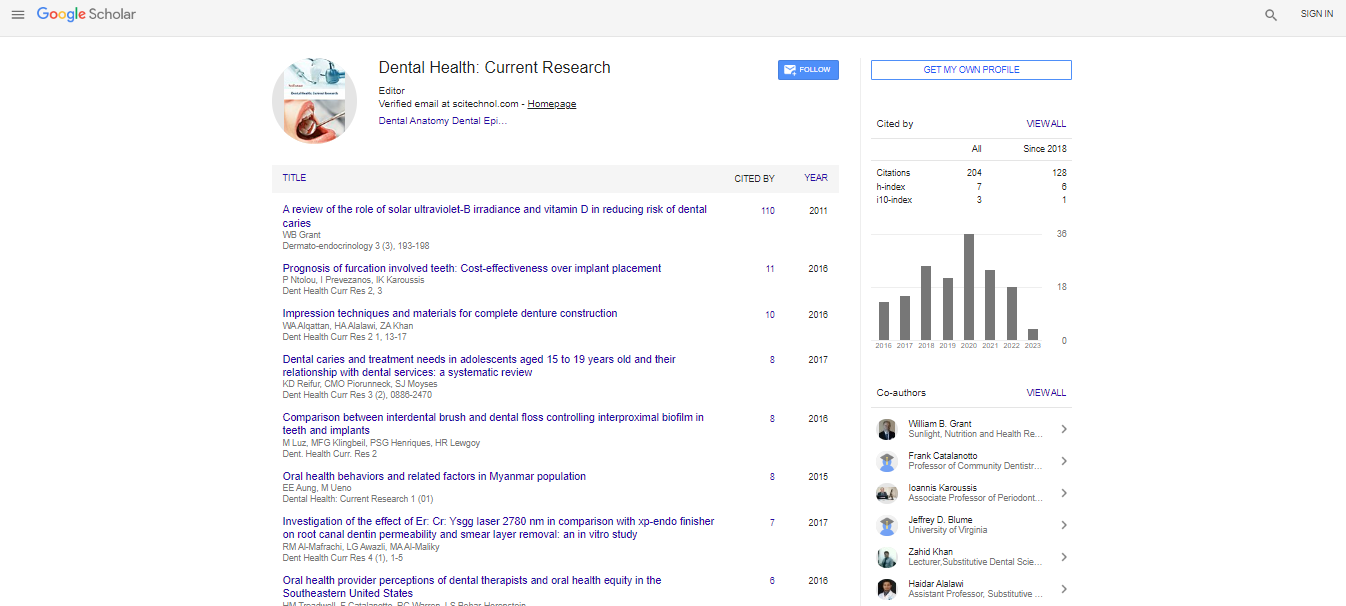Perspective, Dent Health Curr Res Vol: 10 Issue: 4
Enhancing dental care: Essential Practices for a Lifetime of Healthy Smiles
Waseem Orfali*
1Department of Dental Public Health, King Abdulaziz University, Jeddah, Saudi Arabia
*Corresponding Author: Waseem Orfali,
Department of Dental Public Health,
King Abdulaziz University, Jeddah, Saudi Arabia
E-mail: wasee890@uni.sa
Received date: 22 July, 2024, Manuscript No. DHCR-24-147384;
Editor assigned date: 24 July, 2024, PreQC No. DHCR-24-147384 (PQ);
Reviewed date: 07 August, 2024, QC No. DHCR-24-147384;
Revised date: 14 August, 2024, Manuscript No. DHCR-24-147384 (R);
Published date: 21 August, 2024, DOI: 10.4172/2470-0886.1000226
Citation: Orfali W (2024) Enhancing dental care: Essential Practices for a Lifetime of Healthy Smiles. Dent Health Curr Res 10:4.
Description
Dental care is a vital aspect of overall health and well-being, encompassing a range of practices aimed at maintaining the health of teeth, gums and the entire oral cavity. Proper dental care involves daily habits such as brushing and flossing, as well as regular visits to the dentist for professional cleanings and check-ups. Beyond these routine practices, dental care also includes the management and treatment of specific dental issues, from cavities and gum disease to more complex procedures like root canals and orthodontics.
The foundation of effective dental care lies in daily oral hygiene practices. Brushing and flossing are the fundaments of maintaining clean teeth and healthy gums. Brushing at least twice a day with fluoride toothpaste helps remove plaque; a sticky film of bacteria that forms on the teeth and can lead to cavities and gum disease. It is important to use a toothbrush with soft bristles and to replace it every three to four months or sooner if the bristles become frayed. Proper brushing technique involves using gentle circular motions to clean all surfaces of the teeth, including the front, back and chewing surfaces.
Mouthwash can also be a beneficial addition to daily oral hygiene. Antibacterial mouthwashes can help reduce plaque and prevent gingivitis, while fluoride mouthwashes can strengthen enamel and protect against tooth decay. However, mouthwash should not replace brushing and flossing but should be used as an adjunct to these practices. While daily oral hygiene is important, professional dental care is essential for maintaining long-term oral health. Regular dental check-ups, typically recommended every six months, allow for early detection and treatment of dental issues before they become more serious. During these visits, a dentist or dental hygienist will perform a thorough cleaning to remove plaque and tartar buildup, which cannot be removed by brushing and flossing alone. This cleaning helps prevent cavities, gum disease and other oral health problems.
Fluoride treatments and dental sealants are two preventive measures that dentists may recommend, especially for children or individuals at high risk of cavities. Fluoride treatments involve the application of a concentrated fluoride solution to the teeth, which helps strengthen the enamel and prevent decay. Dental sealants are thin, protective coatings applied to the chewing surfaces of the back teeth, where cavities are most likely to develop. Sealants can protect these teeth from decay for several years. Diet plays a significant role in dental care. Consuming a balanced diet that is low in sugars and acidic foods can help protect teeth from decay. Sugary and starchy foods provide a food source for the bacteria in the mouth, which produce acids that can erode tooth enamel and lead to cavities. Limiting the consumption of sugary snacks and drinks, such as candy, soda and fruit juices, is essential for preventing tooth decay. Instead, a diet rich in fruits, vegetables, whole grains, lean proteins and dairy products can support oral health by providing the necessary nutrients for strong teeth and gums.
Calcium and vitamin D are particularly important for dental health, as they help maintain strong bones and teeth. Dairy products like milk, cheese and yogurt are excellent sources of calcium, while vitamin D can be obtained from sunlight exposure and foods like fatty fish and fortified products. Additionally, foods high in fiber, such as fruits and vegetables, stimulate saliva production, which helps neutralize acids and wash away food particles from the teeth. Dental care needs can vary at different stages of life. For children, establishing good oral hygiene habits early on is needed for preventing cavities and ensuring healthy tooth development. Parents should supervise brushing and flossing until children are capable of doing it effectively on their own. Regular dental visits should begin by the child’s first birthday or when the first tooth appears.
Conclusion
Comprehensive dental care is essential for maintaining healthy teeth and gums throughout life. By practicing good daily oral hygiene, seeking regular professional dental care, making informed dietary and lifestyle choices and addressing the specific dental care needs at different life stages, individuals can prevent common dental issues and enjoy a healthy, confident smile. Dental care is not just about aesthetics; it plays a key role in overall health and well-being, making it a priority for everyone.
 Spanish
Spanish  Chinese
Chinese  Russian
Russian  German
German  French
French  Japanese
Japanese  Portuguese
Portuguese  Hindi
Hindi 